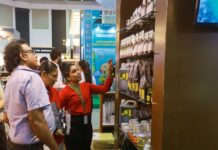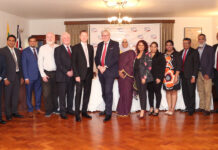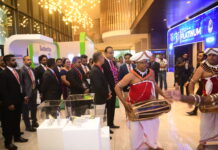Sri Lanka Agripreneurs’ Forum (SLAF) is the premier agribusiness association in Sri Lankan representing growers, farmer organizations, agri value-addition enterprises, agri professionals & academics, agri scientists, local and global marketers of agri produce, providers of agri inputs, and local agri investors thereby serves as the pivotal body for all of the agribusiness communities in Sri Lanka.
Sri Lanka Agripreneurs forum conducted a timely webinar that encapsulates a well-debated topic currently; Insights on new regulations on organic and inorganic agri-inputs – how to face the real-world challenges as an entrepreneur. The session successfully took place on the 2nd of September with the participation of over 140 participants from the Sri Lankan agricultural sector.
This timely discussion brought clarity on areas such as; the current status of the policy changes instigated since April 2021, national perceptions of the change to the agrochemical importation policy in the short, medium, and long terms, effective use of chemical fertilizer, and plant nutrient management, export market opportunities for organic products.
An interactive industry discussion shed light to many of the grey areas of the current situation and created a platform to discuss avenues for an ambitious transformation to an organic agricultural system for Sri Lanka.
The virtual gathering was addressed by speakers, Ranjith Bandara – Chairman, CropLife Sri Lanka); A. S. M. Roshan, assistant director -agribusiness development unit, Department of Agriculture; Suresh De Mel – Chairman, Export Development Board; and then by the panelists Suresh Ellawala – Chairman, Lanka Fruit & Vegetable Producers Processors and Exporters Association; Jayantha Rajapaksha – Executive Committee Member of the Sri Lanka Agripreneurs’ Forum.
An insightful discussion was initiated by each prominent speaker addressing the recent agrochemical regulation change and the national organic policy put in place with its impacts. It was discussed that post-green revolution; Sri Lankan agricultural sector is heavily dependent on the usage of synthetic fertilizer and agrochemicals for decades.
A new set of changes were socialized since April 2021 through a gazette paper starting with a blanket ban on the importation of all agrochemicals to Sri Lanka. Following that change, a series of amendments to the original decision took place in the past 5 months.
As of now, quota-based importation is allowed for the specialty fertilizers under 6 HS codes but it was highlighted that the roll-out of this system hasn’t come to fruition yet, leaving producers under duress.
During this part of the discussion, clarity was brought to the overall need and utilization of agrochemicals in Sri Lanka with the dependency of each sub-sector such as herbicides, pesticides, fungicides etc.
As the dependency of synthetic fertilizer is common across all sub-sectors of the agricultural market system (except for less than 2% of the organic producers), pesticides were highlighted as the most used agrochemical along with herbicides.
The importance of finding suitable replacements for the existing agrochemical demand or allowing a well-regulated and monitored quota of imports into Sri Lanka was discussed as an utmost priority of the NFS and ROP.
The importance of accounting for accurate, potential yield loss was discussed using projections; Current cumulative production of rice, vegetable, OFC, maize is 6,046,768 MT as of 2020/2021 season but this value might be 3,507,125 MT in 2021/ 2022 season accounting for a 42% drop country-wide.
In conventional agriculture, 14% of yield loss is due to weeds, 15% of yield loss is due to insect damage and finally, 13% of yield loss is due to fungal damages. These were the main parameters discussed as the basis to this projected loss in yield. Few parameters were discussed in detail.
In hindsight, the importance and the need of activating the proposed, quota-based importation of specialty fertilizers and agrochemicals were discussed to remedy the forecasted loss in yield specially during the upcoming Maha season and then in the medium term.
Few of the importers and agribusinesses discussed the challenges they have been facing due to the lack of clarity of the current process of granting permits for importing.
Answering these concerns, speakers elaborated on the newly introduced system that’s in place to import a selected number of agrochemicals while agreeing to the length and possible real-time challenges of it.
Further, speakers highlighted that according to the calculations NFS has taken into account, importers will only be able to cater to 25%-30% of the total requirement of specialty fertilizer and agrochemical demand in Sri Lanka by Jan/Feb 2022 for the upcoming Maha season.
Speculations were made on the process of commercial importation of bio-pesticides as these need to follow the ROP guidelines of new item registration; the new biopesticide importation process in reality might take around 4-5 years to flow smoothly.
Speakers further elaborated that producers are expected to plan their fertilizer and agrochemical requirement well in advance, because even the quota-based importation system is likely to progress through a mandatory 3 month period to acquire the approvals/ clearances, logistical arrangements, and final deployment in Sri Lanka.
The importance of taking factors like pandemic caused distress and its impacts causing delays and changes to the logistical arrangements during importation was highlighted as a must-think for the private sector- agribusinesses, government, and policymakers.
An intricate level discussion around the questions raised on testing samples and processes to be followed while importing quota-based fertilizer and agrochemicals, a certain degree of uncertainty was tabled by the speakers as well as the audience, as it is seen as a complicated and high-tech process which Sri Lanka might have limitations to achieve.
Rigorous training and creating awareness among growers, were identified as a mandatory requirement to adopt the new regulations successfully – for example, it creates an opportunity for the relevant stakeholders to create and popularize biotic alternatives to the users of conventional agrochemicals.
As the majority of the Agri producers in Sri Lanka are rurally based, with limited access to clear information, a smooth and effective outflow of valid and viable new information might be viewed as an opportunity to grasp their attention towards a successful implementation of the newly proposed agricultural policy. The urgency, timeliness, and the expected effectiveness of such programs were discussed by the speakers during the session.
The Department of Agriculture has been the successful promoter of the SLGAP certification system that has been in operation for the past couple of years, benefiting Sri Lankan farmers.
One of the distinguished speakers elaborated on the success they have been witnessing through the rollout of the certification and how its learnings may become timelier now than ever. A plant’s nutrient utilization is a complex process that is supported or discouraged by many factors. As commercial producers, farmers should be insightful on how to promote effective nutrient utilization by plants as opposed to the overuse due to free availability in-abundance.
As per the speaker, growers should consider the information revealed by the tested soil profiles and then apply nutrients to bridge the gap. The concept of Integrated Plant Nutrient Management (IPNM) and Integrated Pest Management (IPM) is the two-pillar concept that governs the SLGAP certification while ensuring the quality of the final product. With the constricted availability or in other words, with more regulated/ limited availability of synthetic fertilizer, it’s apparent that the use of it will have to be more effective than before.
Usage of organic manure to the soil was highlighted by the speaker as one of the best measures to enrich and improve the soils while increasing the absorption of synthetic fertilizers.
IPM was also discussed as the best system to improve the yields achieved, through IPNM and to further enhance it. The core notion of IPM is to use physical, cultural, biological controls as the first and second responses to a pest/disease attack and only venture out to chemical controls as the last resort. According to the data of the Department of Agriculture, farmers with SLGAP have reduced the agrochemical and fertilizer use by 50% compared to conventional farmers – this is an evident success story of IPM and IPNM packaged into one certification.
Another facet of the discussion elaborated the opportunities presented by the export markets. A very insightful session was conducted by The Chairman of EDB. The growth of vegan and meatless meat markets and the growth of organic-certified product markets has an explosive growth rate which opens up opportunities for Sri Lankan organic-centered agribusinesses. EDB is currently opening up helplines and creating opportunities for exporters to receive useful and relevant consultations. EDB further supports stimulating the exports of value-added, top-shelf spices to premium markets.
Once the session was opened for Q&A, many of the practical challenges faced by today’s Agripreneur were explicitly discussed along with the identified opportunities.
According to the Fruit and Vegetable Exporter’s Association, institutional growers and farmers are facing challenges to procure the agrochemicals – price hikes had been reported in the last few months, unavailability of agrochemicals, alleged increases in pest and disease incidents and the fear of these issues escalating further. One of the key challenges echoed was the lack of attraction for investment in the next few months.
As the challenges faced by the growers are discussed within grower groups and by the society at large. Hence growers and external investors do not have a clear pathway of progressing further, striving against the agrochemical ban in place. If the scope of investment-interest is to diminish in the future, the food security, the value of the agricultural export basket, and agricultural job security were tabled as concerns.
Responding to one of the questions from the audience, Chairman EDB stated that they are taking measures in the future to promote direct export opportunities to Sri Lankan export-oriented producers. This opportunity will enable them to secure more profits in the end game and thrive more successfully by bypassing the unnecessary intermediaries.
Discussion on the practical viability of using organic fertilizer and agrochemicals were discussed in relation to the scale of the operation – practicality and success rates of a smaller extent farm plots on a trial basis in contrast to the commercial-large scale success.
Finally, as the learnings and the recommendations of the overall session we could summarize that Sri Lanka has a timely need to adopt the principles of integrated plant nutrient management (IPNM) and integrated pest management (IPM).
To adopt these practices viably, it’s important that Sri Lanka has an adequate (not a shortage nor an excess) supply of 2nd and 3rd generation fertilizers and agrochemicals along with certified organic fertilizers.
The opportunity lost by not using 2nd 3rd generation fertilizers prior to the blanket ban of agrochemicals has created severe socio-economic impacts and is likely to negatively impact the economy in the immediate to medium term. In hindsight, Sri Lanka should use the current situation as an opportunity to adapt and streamline the usage/importation of agrochemicals in a structured manner as instructed in the IPM and IPNM guidelines.
The principles of using controlled amounts of synthetic fertilizer by combining with organic manure and only resorting to the use of agrochemicals to control a pest/disease/weed incident as the last resort itself can be highlighted as a direct reduction of volume-usage of agrochemicals by growers. SLGAP (Good Agricultural Practices certification for Sri Lanka) is one of the best available and feasible platforms to ease the expected behavioral change by the growers across the country.
SLAF pledges to initiate more timely conversations in this space as one of the key economic sectors relevant to the Agripreneurs and the country’s economy is being set under the microscope. By initiating more dialogues, we hope to positively impact the decision-making process of associate Agripreneurs in their agribusinesses and also value add to the government decisions by summarizing the thoughts of the private sectors at a macro level.












